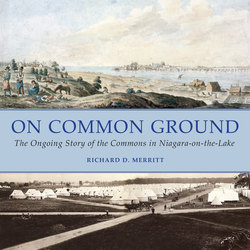On Common Ground

Реклама. ООО «ЛитРес», ИНН: 7719571260.
Оглавление
Richard D. Merritt. On Common Ground
Cover
Table of Contents
Acknowledgements
Introduction
Chapter 1
Chapter 2
Chapter 3
Chapter 4
Chapter 5
Chapter 6
Chapter 7
Chapter 8
Chapter 9
Chapter 10
Chapter 11
Chapter 12
Chapter 13
Chapter 14
Chapter 15
Chapter 16
Chapter 17
Chapter 18
Chapter 19
Chapter 20
Chapter 21
Chapter 22
Chapter 23
Chapter 24
Chapter 25
Chapter 26
Epilogue
Notes
Bibliography
Copyright
Отрывок из книги
We are all indebted to teacher, historian, and author, Janet Carnochan. “Miss Janet” considered the Commons as important as the Plains of Abraham and the battlefields of Waterloo and Bannockburn. Without her staunch opposition to any encroachment, the Commons would not have survived. She also preserved many artifacts relating to the Commons and her books and published papers by the Niagara Historical Society are a rich source of information. Her contemporary, military officer and historian General E.A. Cruikshank, edited and published a vast collection of correspondence that has been an invaluable reference source. I am also greatly indebted to life-long resident and historian Joseph Masters (1871–1955) for publishing his voluminous recollections in the local newspaper as “Niagara Reminiscences and Neighbourhood News,” which is now available on the internet as Ars Historica Niagara.
The much-esteemed current Town Historian, Joy Ormsby, has been my invaluable mentor for the past twenty years.
.....
Barnabas (Barney) Cain is listed as a sergeant in the Indian Department.[41] He was granted town Lot 39 in Niagara, as well as Lots 111 and 114 in Niagara Township (near Virgil). He later served in the Lincoln militia at the Battle of Lundy’s Lane and is said to have carried off the battlefield the lifeless body of his friend George Caughill.[42] As the Department’s blacksmith he would have been kept busy forging a variety of iron hardware, as well as shoeing horses for the employees and the Natives. In some provincial locales the blacksmith also repaired guns and instruments. The smithy was situated by the Council House. Newly remarried in February 1798 by Reverend Robert Addison,[43] he probably hurried home to his new bride, Cyble Clinton, rather than linger about the commons in the evenings.
Interpreters were chosen for their language skills and trustworthiness. At least one and often two interpreters would be present at the various Indian Council meetings, whether at the Council House at Fort George or at meetings held elsewhere such as Buffaloe Creek,[44] Burlington Heights, or the Grand Valley. On occasion they would be sent out as special emissaries or on secret missions. Given their backwoods origins, most interpreters probably preferred to sleep under the stars by a smoking fire, accepting the housekeeper’s invitation to bed down indoors only in inclement weather. Later there may have been separate quarters for the interpreters over by the Council House.
.....